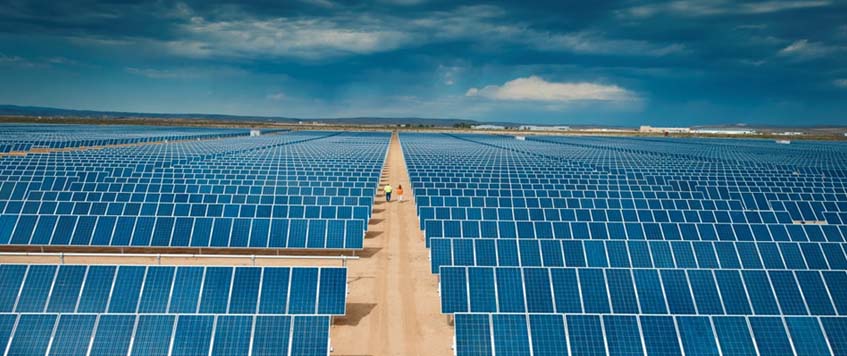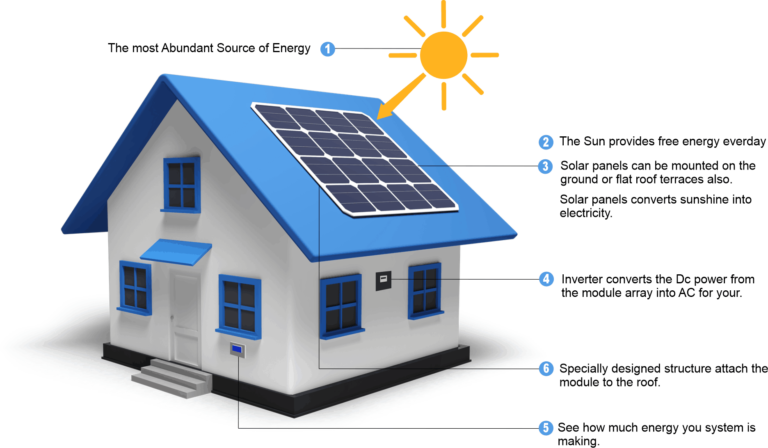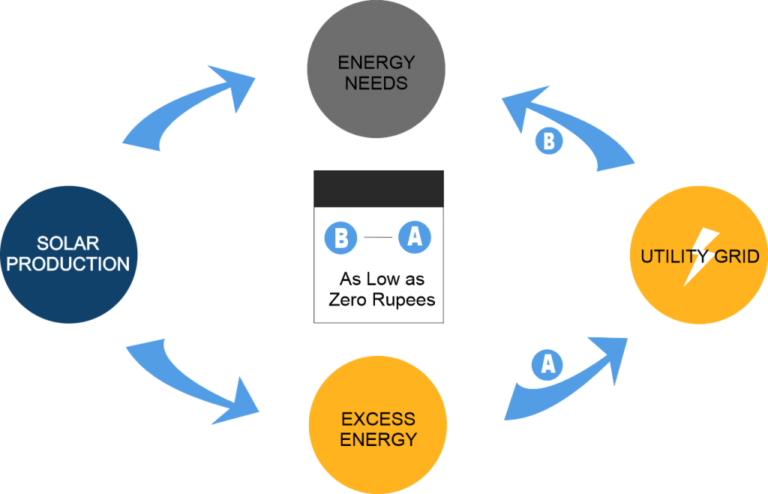How does Solar Energy work?
Solar power is clean green electricity that is either created from sunlight or from heat from the sun. Having solar electricity in your home usually means setting up a solar photovoltaic system on your roof. Discover more in our solar energy education sections ahead. Definition of photovoltaic: Photo = “light” and photons = energy particles coming from sunlight; voltaic = producing a voltage or volts. Abbreviation = PV Solar energy is a renewable free source of energy that is sustainable and totally inexhaustible, unlike fossil fuels which are finite. It is also a non-polluting source of energy and it does not emit any greenhouse gases when producing electricity. The solar electricity that is produced can supply your entire or partial energy consumption.


HOW DO SOLAR PANELS GENERATE ELECTRICITY?
The amount of sunlight that strikes the earth’s surface in an hour a half is enough to handle the entire world energy consumption for a ful year. Solar technologies convert sunlight into electrical energy either through photovoltaic (PV) panels or by concentrating it with mirrors. This energy can be used to generate electricity or be stored in batteries or thermal storage.

Solar Rooftop
Why should I go solar?
Moving towards Sustainable Energy will not only Substantially contribute towards energy conversation, reduced bills but will also boost up the morale in many aspects:
- Solar Is the Future; Generate your own power by Soaking the Sun.
If your roof is not having any shade from adjacent buildings, trees etc., made of RCC and its structure is not delicate then your roof is suitable for installation of a solar plant.
This would depend on various factors such as the shadow-free area available, the orientation of the roof etc., however, as a thumb rule, we can assume 1KW plant requires 12 sq. meters (120-130 sq ft) of shade-free area.
A 7kW to 10kW plant would suffice for a house with an electricity consumption of 800-1200 units a month.
Accordion CoAmplus uses non-penetrating structures which are mounted without any puncturing. In case any insertions are needed, we use chemical agents which guarantee waterproofing and no leakages. Thus, the integrity of the roof is maintained. The load of the entire solar plant is about 10-15 kg/square meter and can easily be taken by any roof.ntent
No, you can install solar if you stay in an independent house
On an average, every 1 KW setup produces 1300 to 1500 units in a year. This may, however, vary based upon the location of the plant, seasonal factors, surroundings and shadow-free area available.
Technically yes, a solar plant can meet your entire power requirement if it is backed by the battery energy storage system (BESS). But practically, where the power requirement is higher it would be recommended to use solar in sync with the grid. When in sync, priority is automatically given to the solar power to be consumed first.
The Solar plant will generate electricity only during the sunny hours, typically between 6am to 6pm and will not generate any electricity during the night.
The RoI lies in the 15%-30% depending on the system size and the structure you decide to install. Our 10kW product will help you save around Rs.45 lakhs in its lifetime.
Output from Solar PV system is dependent on intensity of light and duration of the day. In rainy and winter seasons, output is slightly lower but still the system works smoothly as sunlight is available most of the time.
A solar system requires minimal maintenance as there are no moving parts. While panels come with 25 years warranty, individual components have different warranties. Regular cleaning of the panels, once in 15 days, is enough for optimal performance of the system.
The panels come with 25 years warranty. 10 years for 90% performance and subsequent 15 years for 80% performance, the inverters come with a 5 year warranty which can be extended by AMC. We have AMC packages which cover upto lifetime of the product. You can purchase to safeguard your entire system.
You can either pay upfront for the system or pay in EMIs starting at Rs.3040/month for a 3kW Atrium.
You’ll need to have a site approval, feasibility test, and net-metering agreements with the DISCOM. The approvals vary from state-to-state. All the applications and approvals are covered by us.

